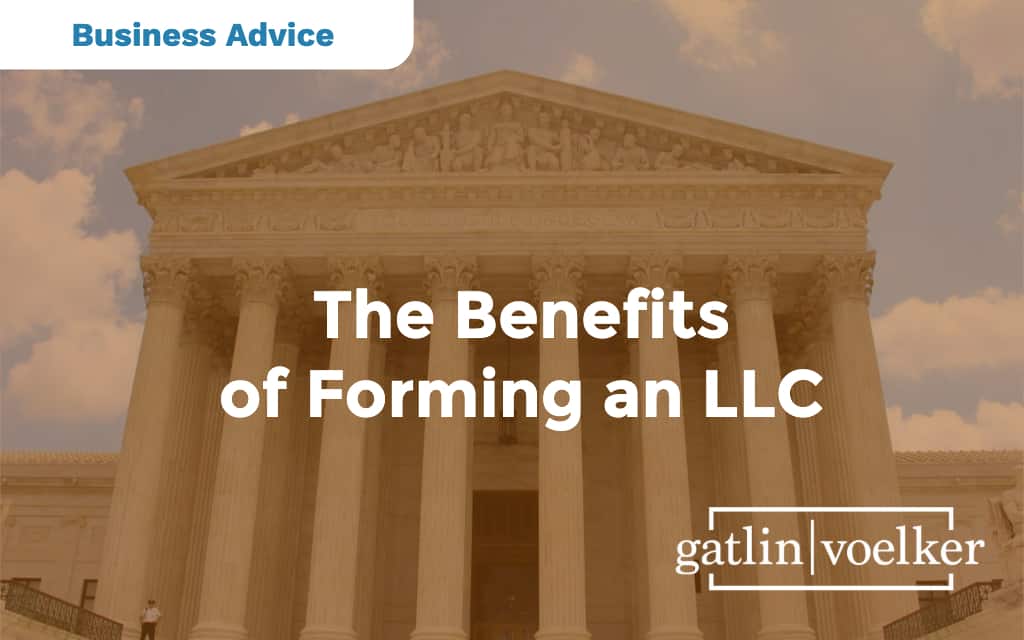Two of the most popular business structures today are limited liability companies (LLC’s) and sole proprietorships. An LLC is simple to set up and easy to maintain while both LLC’s and sole proprietorships offer various benefits. However, if you are deciding between the two, it is often the case that the benefits of an LLC surpass those of a sole proprietorship.
What Is an LLC?
An LLC is a business structure that is recognized at the state level but has possible federal tax implications. In some ways an LLC mirrors a corporation and in some ways it resembles a sole proprietorship. An LLC is characterized by a flexible business structure, legal protection of the owner’s personal assets, and possible tax advantages.
What Is a Sole Proprietorship?
A sole proprietorship is the simplest business structure. In a sole proprietorship, there is one owner whose personal assets are not distinct from their business assets. It is essentially equivalent to the single owner, and is formed by the act of doing business. There are no state forms or filing requirements other than taxes.

Benefits of Forming an LLC Instead of a Sole Proprietorship
Every business decision you make includes a set of objective facts applied to a subjective situation. In many scenarios, an LLC ends up offering more benefits for a small business than a sole proprietorship, but it always depends.
That being said, some of the typical benefits of LLC’s include the following.
Taxes. When it comes to taxation for LLC’s and sole proprietorships, there are some similarities, but also a few important differences in key categories:
- Double taxation. Both LLC’s and sole proprietorships avoid the double taxation that corporations undergo; however, depending on your individual tax rates, it may make sense to be taxed at the corporate level. Always consult with a tax professional. This is because the IRS considers both business structures to be “pass-through entities,” meaning that any business income is reported through the owner’s (or owners’) individual tax return rather than a separate business return. An LLC enjoys this privilege because it is only recognized at the state level as a registered business; federally, an LLC is recognized as a sole proprietorship.
- S corp filing. A sole proprietorship does not have the option to file as an S corporation, while an LLC can elect to file as a partnership or corporation or be a disregarded entity. Depending on the individual situation, this flexibility may result in overall tax savings for the LLC.
- Self-employment tax. Both LLC’s and sole proprietorships are subject to self-employment tax, which can be high. However, some self-employment taxes can be reduced for higher wage earners.
Funding. The flexibility of an LLC will encourage funding by investors. An investor will be able to gain ownership interest without the risk of liability. If you plan to expand ownership or get a loan, an LLC will work better for you in most cases.
Formation and Legal Requirements. It doesn’t get easier than creating a sole proprietorship, but LLC’s are also easy to start and maintain. Both require little paperwork, and most states have minimal regulations for operating an LLC (for example, you are not required to have regular shareholder meetings).
Looking to start your own business but not sure where to begin? Our experienced business attorneys are here for you. Contact us to set up an appointment to discuss your goals and create a plan.
Ownership. This may seem like an obvious difference, but in a sole proprietorship, there is just one owner, whereas an LLC can have one or more owners. There is quite a bit of flexibility allowed by an LLC, since it can be run by either the owner or owners (called “members”), or by managers (elected by members). There are also multiple leadership structures available to an LLC, so you can keep it simple or model it off a corporation with a board of directors.
Liability. This is perhaps the most significant area of concern when it comes to sole proprietorships, and it is often the area where LLC’s carry the most weight in a decision between the two structures. There is potentially a lot of risk associated with sole proprietorships due to the following:
- Personal loss. A sole proprietorship offers no separation of business and personal assets; this means if you end up in debt or you are being sued, your personal assets can easily be attacked and lost. Even if you have to file bankruptcy, your personal assets will be affected.
- Termination of the business. If a sole proprietor passes away or becomes unable to run the business, the business will be terminated by default.
To mitigate these concerns, a sole proprietor can purchase business insurance appropriate for their industry. While it can be expensive and won’t solve the issue entirely, it is worth considering if you strongly feel a sole proprietorship is right for you.
Overall, the benefits of an LLC outweigh a sole proprietorship in this area. With an LLC, if you are sued or dealing with debt, your personal assets will be protected as long as you didn’t act fraudulently, unethically, or irresponsibly in the events leading up to the lawsuit or debt.

Things to Consider When Choosing an LLC or Sole Proprietorship
Your industry. Perhaps if you started a neighborhood lawn care business or work as a freelance blogger, a sole proprietorship will make more sense for you because you don’t have as pressing a need for the benefits of an LLC. On the other hand, if your business carries inventory or you are in an industry that is more likely to be sued (such as construction), an LLC is probably going to be a wiser decision for you.
Your ownership plan. If you plan to bring on partners or hire employees, an LLC typically offers better protection and tax advantages.
Your goals for your business. Owners who wish to expand their business down the line, especially if it’s a long-term expansion plan, should seriously consider forming an LLC.
The bottom line: In most cases, an LLC is going to be a better choice for a business due to the asset protection, flexibility, and tax advantages it provides, but it does depend on your unique situation. Before making any major business decision, it’s best to consult with an attorney first to understand your options and move forward in the best way for your business.
Wondering whether an LLC or sole proprietorship is right for you? Get in touch with one of our business attorneys today. We are business owners ourselves, so we understand how much your business means to you and how important it is to make the best decisions.










